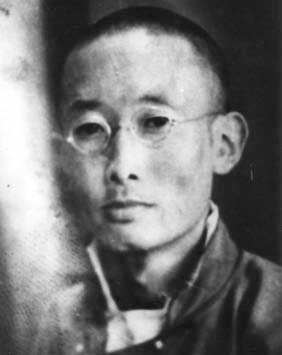Gendün Chöphel on:
[Wikipedia]
[Google]
[Amazon]

 Gendun Chompel or Gendün Chöphel () (1903–1951) was a Tibetan scholar, thinker, writer, poet, linguist, and artist. He was born in 1903 in Shompongshe, Rebkong,
Gendun Chompel or Gendün Chöphel () (1903–1951) was a Tibetan scholar, thinker, writer, poet, linguist, and artist. He was born in 1903 in Shompongshe, Rebkong,
Gendun Choephel
*The Story of a Monk Wanderer: part
, part
Gendun Choephel
– Angry Monk website {{DEFAULTSORT:Choephel, Gendun 1903 births 1951 deaths Buddhist artists Tibetan Buddhists from Tibet Tibetan Buddhism writers Tibetan painters 20th-century Tibetan painters Tibetan poets

 Gendun Chompel or Gendün Chöphel () (1903–1951) was a Tibetan scholar, thinker, writer, poet, linguist, and artist. He was born in 1903 in Shompongshe, Rebkong,
Gendun Chompel or Gendün Chöphel () (1903–1951) was a Tibetan scholar, thinker, writer, poet, linguist, and artist. He was born in 1903 in Shompongshe, Rebkong, Amdo
Amdo ( �am˥˥.to˥˥ ) is one of the three traditional Tibetan regions, the others being U-Tsang in the west and Kham in the east. Ngari (including former Guge kingdom) in the north-west was incorporated into Ü-Tsang. Amdo is also the ...
. He was a creative and controversial figure and is considered by many to have been one of the most important Tibetan intellectuals of the twentieth century.
Chöphel was a friend of the Indian scholar and independence
Independence is a condition of a person, nation, country, or state in which residents and population, or some portion thereof, exercise self-government, and usually sovereignty, over its territory. The opposite of independence is the statu ...
activist Rahul Sankrityayan. His life was the inspiration for Luc Schaedler's film ''The Angry Monk: Reflections on Tibet''. He is best known for his collection of essays called ''The Madman's Middle Way: Reflections on Reality of the Tibetan Monk Gendun Chophel''. and ''Grains of Gold: Tales of a Cosmopolitan Pilgrimage'', written during his time in India and Sri Lanka in between 1934 and 1946. These essays were critical of modern Hinduism
Hinduism () is an Indian religion or '' dharma'', a religious and universal order or way of life by which followers abide. As a religion, it is the world's third-largest, with over 1.2–1.35 billion followers, or 15–16% of the global p ...
, Christianity
Christianity is an Abrahamic monotheistic religion based on the life and teachings of Jesus of Nazareth. It is the world's largest and most widespread religion with roughly 2.38 billion followers representing one-third of the global pop ...
, and British imperialism
The British Empire was composed of the dominions, colonies, protectorates, mandates, and other territories ruled or administered by the United Kingdom and its predecessor states. It began with the overseas possessions and trading posts esta ...
. While condemning places and events like the Black Hole of Calcutta
The Black Hole of Calcutta was a dungeon in Fort William, Calcutta, measuring , in which troops of Siraj-ud-Daulah, the Nawab of Bengal, held British prisoners of war on the night of 20 June 1756. John Zephaniah Holwell, one of the Britis ...
and the Goa Inquisition
The Goa Inquisition ( pt, Inquisição de Goa) was an extension of the Portuguese Inquisition in Portuguese India. Its objective was to enforce Catholic Orthodoxy and allegiance to the Apostolic See of Rome (Pontifex). The inquisition primaril ...
, he praised certain British colonial practices like the abolition of sati
Sati or SATI may refer to:
Entertainment
* ''Sati'' (film), a 1989 Bengali film by Aparna Sen and starring Shabana Azmi
* ''Sati'' (novel), a 1990 novel by Christopher Pike
*Sati (singer) (born 1976), Lithuanian singer
*Sati, a character in ''Th ...
.
His erotic classic, ''Treatise on Passion'' (), was completed in 1939, though it was first published posthumously in 1967. Written in Tibetan verse, this poetic and practical work was inspired both by his reading and partial translation of the ''Kama Sutra
The ''Kama Sutra'' (; sa, कामसूत्र, , ; ) is an ancient Indian Sanskrit text on sexuality, eroticism and emotional fulfillment in life. Attributed to Vātsyāyana, the ''Kama Sutra'' is neither exclusively nor predominantly ...
'' (introduced to him by Sankrityayan) and by his own recent, and prolific, sexual awakening. The work aims to provide extensive guidance on heterosexual lovemaking and sexual happiness for both women and men in an overtly democratic spirit. By now an ex-monk, Chöphel was happy to compare favourably his detailed sexual guidance (written from a lay, tantric perspective) to that contained in an earlier – and much less explicit – work bearing a similar title composed by Mipham the Great.
See also
*Tibet Improvement Party
The Tibet Improvement Party (; ) was a nationalist, revolutionary, anti- feudal and pro- Republic of China political party in Tibet. It was affiliated with the Kuomintang and was supported by mostly Khampas, with the Pandatsang family playing ...
References
Sources
Translations
* * * * *Other sources
* * Dhondup, K.: "Gedun Choephel: the Man Behind the Legend". ''Tibetan Review'', vol. 13, no. 10, October 1978, p. 10–18. * * * * * * Roerich, George N. and Gedun Choephel (Translator) (1988). ''TheBlue Annals
The ''Blue Annals'' (), completed in 1476, written by Gö Lotsawa Zhönnu-pel (, 1392–1481), is a Tibetan historical survey with a marked ecumenical (Rimé movement) view, focusing on the dissemination of various sectarian spiritual traditions t ...
'' by Gö Lotsawa. Motilal Banarsidass, Delhi, 1976, Reprint in 1979. eprint of Calcutta, Royal Asiatic Society of Bengal, 1949, in two volumes
External links
Gendun Choephel
*The Story of a Monk Wanderer: part
, part
Gendun Choephel
– Angry Monk website {{DEFAULTSORT:Choephel, Gendun 1903 births 1951 deaths Buddhist artists Tibetan Buddhists from Tibet Tibetan Buddhism writers Tibetan painters 20th-century Tibetan painters Tibetan poets